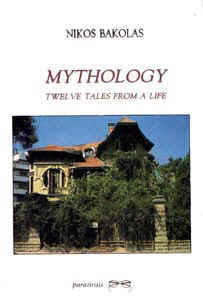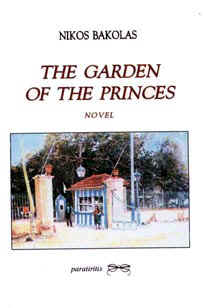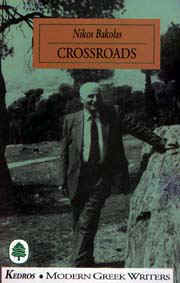|

επιστροφή
Mythology
Prologue to the third edition
The very title of this book automatically summons up the days
of story and legend. The twelve short tales contained in this work
considered by many to constitute a single story, are written in the third
person (a new departure for the author), and betray a more objective view of
the world and a more substantive exploitation of his social probing. This
does not however mean that he has entirely abandoned the technique which
served him so well in his earlier works (e.g. The Garden of the Princes),
based on fleeting memory, fluidity of event, concatenations of thoughts and
relationships.
The twelve
tales in "Mythology" (first published in 1977) transmute, as one critic has
put it, an old family history into a national myth Towards the end of the
19th century a village lad from Epirus comes to Thessaloniki to seek his
fortune, shares that city's turbulent history for the next half century,
succeeds -overcoming a thousand difficulties- in building up an estate, only
to end his days ruined and palsied. Along with the story of his life as
presented in successive scenes, there unfolds in these tales a picture of
the development of urban life in modern Greece, in all its positive and
negative aspects. This book won widespread critical acclaim and was awarded
the "Plotinus" prize.
Published by Paratiritis, 1997
Επιστροφή στην προηγούμενη σελίδα
επιστροφή

The garden of the Princes
Prologue to
the third edition
Nikos Bakolas' novel "The
Garden of the Princes", first printed in 1966, is based on the story of the
House of Atreus, as it has been handed down to us through the ancient
tragedies, mainly, but also through the epics of Homer. In his novel the
story has been transplanted into the twentieth century, to the years
immediately preceding and immediately following the Catastrophe in Asia
Minor. Exploiting the perennity of the conflict between Agamemnon and
Clytemnestra (male/female) both within the family and outside it, the author
explores and presents the dense web of relationships and oppositions within
the family, as well as that of the bonds of passion extending beyond the
family and leading finally to bloodshed.
In "The Garden of the
Princes", Bakolas writing is both very personal and very modern in its
vision and expression. His extensive use of the devices of stream of
consciousness and interior monologue are both a continuation and a
development of the tradition of prose writing in Thessalonih. The poetry and
the passion with which he regards both the inner and the outer world,
combined with the fecundity of his rhythmic prose, make "The Garden of the
Princes" not only one of Nikos Bakolas' most important books but, as the
critics have said, "an inspired piece of writing, perhaps the most personal
of all his works".
Published by Paratiritis, 1997
Επιστροφή στην προηγούμενη σελίδα
επιστροφή

Crossroads
(Η
Μεγάλη Πλατεία)
THESSALONIKI:
the crossroads between East and West … And in the turbulent, trouble-torn 20th
century the city in which four lives cross, directly or indirectly …
Nikos Bakolas
tells how ordinary men and women struggled to survive during a period of
Greek history - roughly from the 1930s to the late 1940s - marked by
oppression and violence and political polarities: the fascist dictatorship
of Metaxas, the German Occupation, the Civil War. Against this background
Fotis, jack-of-all-trades and adventurer, Christos, struggling journalist,
Yannis, ambiguous scion of a well-to-do family, and Angela, orphan refugee
from Asia Minor, -as well as Fotis’s son and Christos’s three children -
grow to maturity and taste both sweetness and pain.
Interspersed
between the chapters of this 20th century story is an imaginative
and impressionistic recreation of a period of turbulence that occurred in
Thessaloniki 6000 years earlier - the Zealots’ uprising of the 1340s.
Characters, events and a bittersweet love story in the Middle Ages closely
parallel those of the more recent past.
Finally, to
complete this complex interweaving of history and fiction, the footnotes
provide a third dimension: fact, in the form of personal memories.
Crossroads
describes a time of cruelty, suffering
and violence, yet with its compassionate tone the novel is a quiet
celebration of the courage and endurance of the human spirit.
Ttanslated by Caroline
Harbouri, July 1997
|